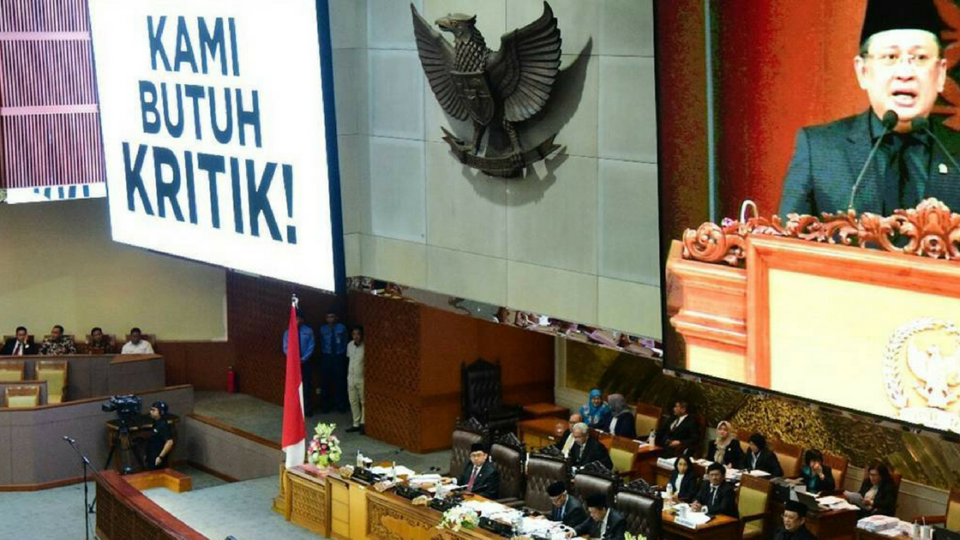If you have something bad to say about Indonesia’s House of Representatives (DPR) or any of its members, you’d best say it extremely carefully. A controversial law passed by the DPR one month ago, referred to as UU MD3, goes into effect starting today. And its most contentious article has the potential to criminalizes anybody who criticizes the legislative body or its members.
On February 12, the DPR ratified Bill No 17 of 2014 concerning the MPR (People’s Legislative Council), DPR, DPD (Regional Representatives Council) and DPRD (Regional House of Representatives), which has been shortened in the Indonesian media as UU MD3. The bill contains a plethora of new laws which covers every level of legislative body in the Indonesian government but there are several articles that critics say are especially dangerous.
One of those, article 122, gives the DPR’s Ethics Council (MKD) the power to take legal action against individuals, groups or legal entities that “degrade the honor of the DPR or DPR members”. As is typical in Indonesian legislation, what constitutes a “degradation” of honor is left undefined, leaving the door wide open for the law to be used to criminalize legitimate criticism of legislators.
The bill managed to pass with little notice at first, which some suggested was due to public and activist attention being focused on the DPR’s possible passage of an equally controversial revision to the country’s Criminal Code (RKUHP). But after the bill’s passage, condemnations quickly grew loud, with one critic saying UU MD3 would “drag Indonesia into a dark era of democracy”.
House Speaker Bambang Soesatyo defended the article, saying that DPR members had the right to “defend their honor” just like members of any other profession. Also defending the bill was Deputy House Speaker Fadli Zon, who just days before voting for the UU MD3 had criticized an article in RKUHP that would make insulting the president illegal for being undemocratic.
After the bill was ratified by the DPR, it landed on the desk of President Joko Widodo to await his signature. Amid the outcry by critics, Jokowi said he would not sign the bill immediately due to its potential threat to democracy and consulted with several legal experts on what he could do.
Draft UU MD3 sudah ada di meja saya, tapi belum saya tandatangani. Saya memahami keresahan yg ada di masyarakat mengenai hal ini. Kita semua ingin kualitas demokrasi kita terus meningkat, jangan sampai menurun -Jkw
— Joko Widodo (@jokowi) February 21, 2018
But the president’s hands were largely tied. Once a law has been passed by the DPR, a president does not have veto power over it and, even without his signature, it will automatically go into effect after 30 days.
“Starting today, UU MD3 has been enacted automatically, and also all of its articles become applicable,” Feri Amsari, an expert on constitutional law at Andalas University, confirmed to Detik today.
In addition to the article regarding criticism of the DPR and its members, critics have also taken aim at UU MD3’s article 73, which allows the DPR to order the police to forcibly summon individuals for questioning, as well as article 245, which requires investigators to get permission from either the president or the MKD in order to question DPR members about criminal cases.
Jokowi is believed to be considering passing a presidential decree (perppu) to negate UU MD3 or certain articles within it, but that would almost certainly upset the political parties that supported the bill’s passage (which was most of them, including many within his coalition). Challenges to the law have been filed in the Constitutional Court, but there’s no way to know yet how long it may take before the court would hear these.




